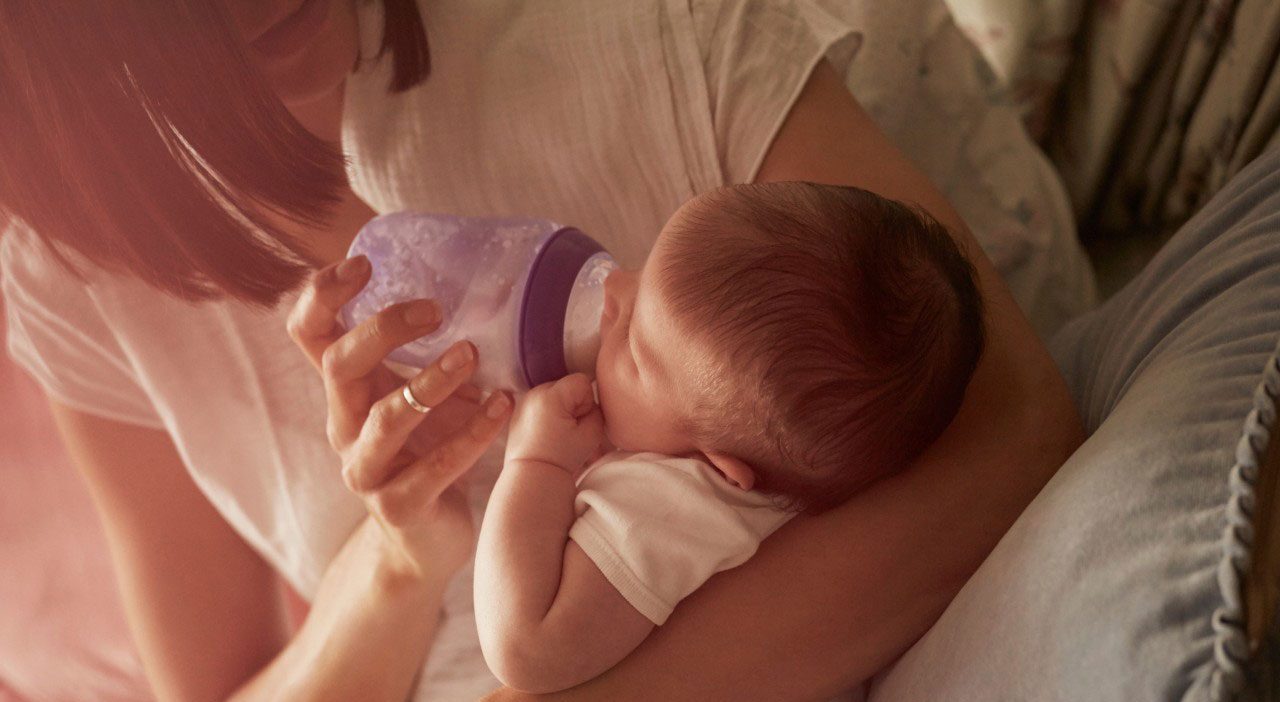Don’t Feel Guilty About Bottle Feeding Breast Milk

Your milk is a perfect food for your baby, even if it comes from a bottle. But try not to mix in formula with breast milk. Here's what you should know.
Breast milk is nature’s infant food. The American Academy of Pediatrics recommends that babies feed exclusively on breast milk for their first six months and receive it alongside food for two years or more.
Mothers who don’t meet that goal aren’t alone. Only a quarter of U.S. babies six-months-old are on an all-human milk diet, and 44 percent aren’t getting any breast milk, according to data from the Centers for Disease Control and Prevention.
That’s not because mothers don’t want to breastfeed. Fewer than half of families reach their breastfeeding goals, says Paula Schreck, MD, the medical director for breastfeeding support services at Ascension St. John Hospital in Detroit. “We know that sometimes, to reach your goals, you need encouragement and support.”
Try to get the support you need. It's worth the effort.
YOU MIGHT ALSO LIKE: Breastfeeding Tips for New Moms
The case for breast milk
Breast milk contains an ideal combination of proteins, fats, vitamins, and carbohydrates as well as substances that combine to protect your child against illness. Any human milk improves a child’s chances of a healthy start to life.
Ideally, you’ll keep it up even as your child gets bigger. After six months of feeding only breast milk, aim to make breast milk about half of your child’s diet until age one, and up to a third from age one to two, experts suggest.
Although you may decide you need to mix in some formula earlier, or stop expressing milk entirely sooner, try to put it off. While infant formula is still healthy, it’s best to feed your baby breastmilk for as long as possible.
Consider your family’s particular health risks. If you or the child’s father have asthma, your baby has a three to six times greater risk of having it as well.
Breast milk can help. In an analysis combining three studies that together involved more than 2,000 mother-child pairs, researchers found that feeding babies only breast milk for two to four months lowered their risk of asthma by 36 percent. The risk was cut almost in half for a baby that lived only on breast milk for six months. Mixing in formula, juices, or other foods didn’t provide the same protection.
Expressing your milk for as long as possible may be good for your health as well, particularly as a defense against ovarian cancer.
Breast milk from a bottle
Breastfeeding bonds you with your baby, but human milk is still beneficial from a bottle.
Rather than switch to formula as soon as you can’t be with your child to breastfeed, consider pumping. Maybe you’ll exclusively pump.
Look for exclusive pumping support groups online. You can also find groups to help you maintain a partial-pumping routine.
Bottle feeding breast milk has many advantages. For fathers and other family members, the bonding of feeding may be more powerful than simply holding a baby or changing a diaper.
Parents who bottle feed may also feel more bonded with each other. Imagine sleeping through the night while your husband cradles your child and, the next evening, checks whether the bottles are full.
To make the transition from breast to bottle feeding with expressed milk, plan ahead. Aim for at least a month of breastfeeding. That will keep your milk flowing and help your child adapt to a bottle nipple. If you’ll be returning to an office, add a bottle of your milk for feedings one or two weeks beforehand, at a time of day when you normally are apart.
Even if you have a longer maternity leave, you might introduce a bottle of expressed milk after about two months.
When the moment to add bottle feeding arrives, try a few different types of bottles to see if your baby has a preference. Start bottle feeding during the second feeding of the day. It may also help if you give the bottle to another person familiar to the baby, so your breasts aren’t immediately available.
You’re likely to have more milk in the mornings, so you might begin pumping right after the first feeding. You can rent a hospital-quality electric breast pump in many areas. Check Medelabreastfeedingus.com.
Rent or buy a double electric breast pump if you plan to feed your baby almost entirely with breast milk. If not, a manual pump could do. Find a way to free up your hands while pumping: Cutting slits into a sports bra and inserting the cups may work.
Don’t beat yourself up if you opt for formula earlier than you’d like. You might be working and have no time to breast pump. You might need to know exactly how much your baby is eating. You might want to drink wine without worrying about dousing your child’s brain in alcohol from your breast milk.
The most common reasons for using formula are a combination of breastfeeding difficulties and conflicts with a job. That’s called life.
Updated:
October 19, 2023
Reviewed By:
Janet O’Dell, RN